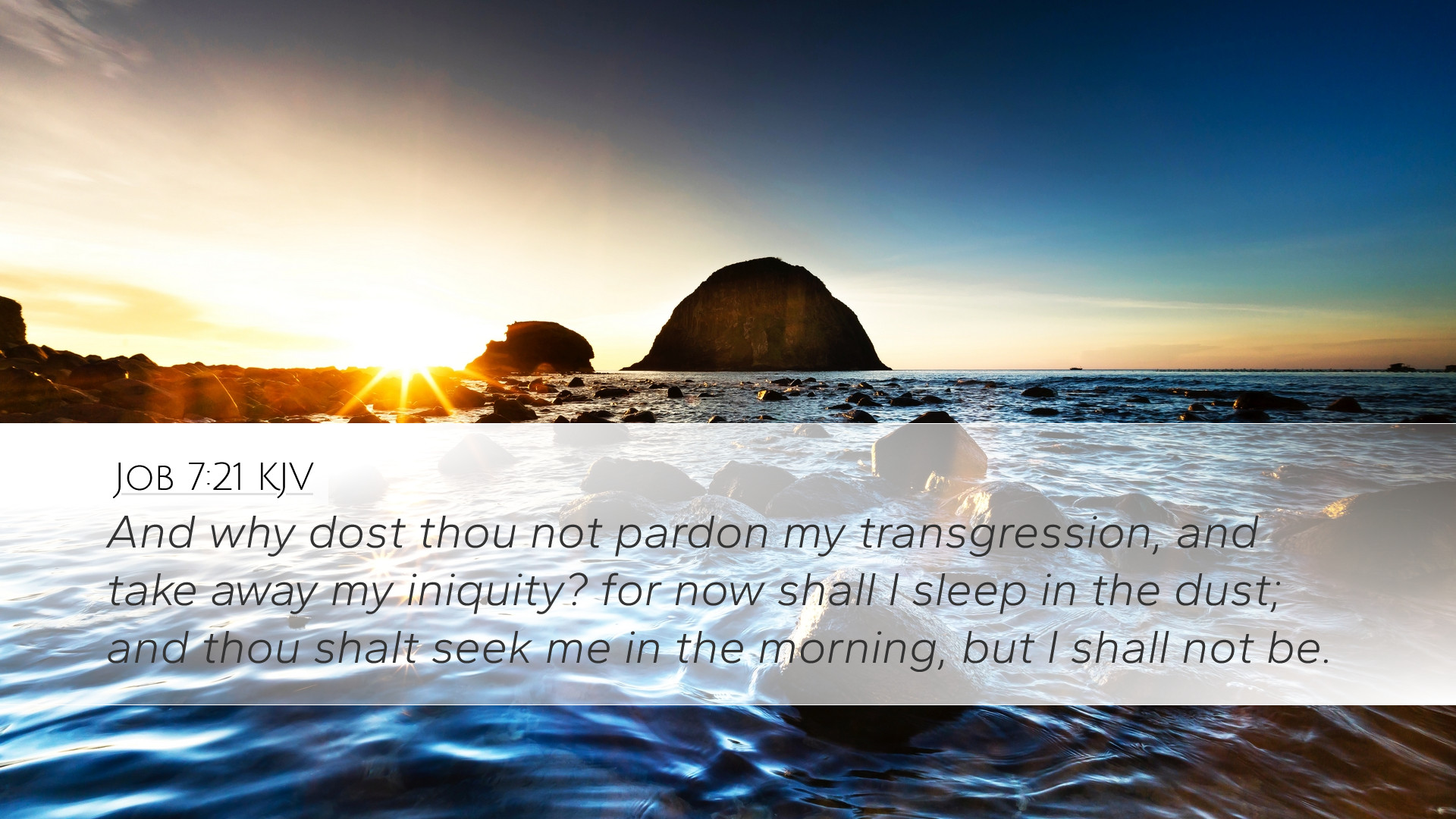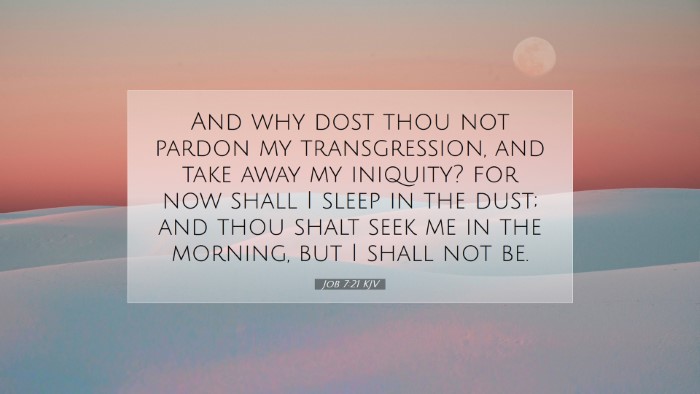Old Testament
Genesis Exodus Leviticus Numbers Deuteronomy Joshua Judges Ruth 1 Samuel 2 Samuel 1 Kings 2 Kings 1 Chronicles 2 Chronicles Ezra Nehemiah Esther Job Psalms Proverbs Ecclesiastes Song of Solomon Isaiah Jeremiah Lamentations Ezekiel Daniel Hosea Joel Amos Obadiah Jonah Micah Nahum Habakkuk Zephaniah Haggai Zechariah MalachiJob 7:21
Job 7:21 KJV
And why dost thou not pardon my transgression, and take away my iniquity? for now shall I sleep in the dust; and thou shalt seek me in the morning, but I shall not be.
Job 7:21 Bible Commentary
Commentary on Job 7:21
Verse Context: Job 7:21 states, “Why dost thou not pardon my transgression, and take away my iniquity? For now shall I sleep in the dust; and thou shalt seek me in the morning, but I shall not be.” This verse encapsulates Job's anguish in the midst of his suffering, highlighting his longing for forgiveness and his understanding of mortality.
Insights from Commentary
In this verse, Job is portrayed as desperate and longing for reconciliation. He recognizes his plight and the fleeting nature of life, revealing profound theological and existential questions. The following insights are taken from esteemed public domain commentaries:
Matthew Henry's Commentary
- Job's Appeal for Forgiveness: Matthew Henry emphasizes that Job, amidst his affliction, turns to God with a plea for forgiveness. He portrays Job as someone who acknowledges his sins, aware of the weight they carry. Henry explains that Job’s request is not merely about his past sins, but it reflects a desire for God’s mercy and grace.
- Mortality and Human Fragility: Henry notes Job’s contemplation of death as he states, “I shall sleep in the dust.” This phrase signifies the human condition and the inevitability of mortality, prompting a deeper reflection on life’s transitory nature. Henry posits that Job’s despair is intertwined with his understanding of his own mortality, urging readers to contemplate their spiritual standing before God.
- Request for Divine Presence: Henry offers an insight into Job's longing; he is seeking a restorative relationship with God. He underscores the importance of divine presence in suffering, proposing that Job desires God to leave him not in despair but to restore joy and fellowship.
Albert Barnes' Notes on the Bible
- Understanding Sin and Guilt: Albert Barnes elaborates on Job's acknowledgment of guilt and sin. His insights suggest that Job's question, “Why dost thou not pardon my transgression?” reflects a theological grappling with the concept of sin and the need for atonement.
- Intercessory Role of God: Barnes notes that the request for God to “take away my iniquity” highlights the role of God as an intercessor. He points to the assurance that God is capable of providing clemency, which Job desperately seeks amid his suffering.
- The Finality of Death: Moreover, Barnes reflects on the somber reality presented in this verse concerning death. He emphasizes that Job recognizes the finality of life, making a poignant statement about the afterlife and humanity's fragile existence. His awareness of being “sought... in the morning” serves as a reminder of life’s brevity and the certainty of mortality.
Adam Clarke's Commentary
- Job's Despair: Adam Clarke provides a thorough analysis of Job's emotional state, indicating that Job’s cry reflects deep anguish and profound despair. Clarke highlights the intensity of emotion behind Job’s plea, suggesting that it arises from the isolation and suffering he experiences.
- Theological Reflections on Forgiveness: Clarke discusses the nature of forgiveness in the context of Job’s suffering. He asserts that Job’s anguish is not merely about his personal sins but is tied to the broader question of God’s justice and mercy.
- Hope Beyond Suffering: Although Job experiences deep despair, Clarke suggests that there is an implicit hope within his words. His longing for morning can also symbolize hope for redemption. Clarke argues that even in death, Job expresses a yearning for a renewed relationship with God, thereby emphasizing a complex relationship between suffering, hope, and divine mercy.
Theological Implications
This verse, and the surrounding discourse within the Book of Job, compels a profound reflection on the themes of suffering, forgiveness, and human mortality. It serves as an invitation for pastors, scholars, and theologians to engage in deep theological considerations regarding God’s justice and mercy.
Suffering and Divine Justice
The central theme of suffering in Job invites a critical discussion on how one reconciles pain and divine justice. Job’s inquiry into God’s willingness to forgive serves as a poignant reminder that even in suffering, humanity often seeks connection with the divine. Understanding this interaction is vital for pastoral care, as it relates to comforting those who experience despair.
The Nature of Forgiveness
Job’s exploration of sin and the plea for pardon present an essential discourse on redemption. For theologians, the verse invites engagement with doctrines surrounding sin and grace. Reflecting on Job’s search for forgiveness provides a paradigm through which contemporary believers can understand their standing before God.
Mortality and Hope
Finally, Job’s recognition of mortality, coupled with the hope for restoration, resonates deeply within Christian teachings on eternal life. This duality presents an opportunity for pastoral reflection and teaching, as congregations are often wrestling with the realities of life and death.
Conclusion
In summary, Job 7:21 is a powerful verse that encapsulates critical elements of human experience—suffering, sin, and the quest for divine forgiveness. Insights from esteemed commentators such as Matthew Henry, Albert Barnes, and Adam Clarke enrich the theological understanding of this text. For pastors, students, and theologians, engaging with this verse offers a pathway to explore the depths of human anguish while affirming the enduring hope found in God’s mercy.


